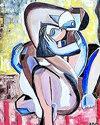Philosophy with Clarice Lispector
IF 0.3
4区 社会学
0 HUMANITIES, MULTIDISCIPLINARY
ANGELAKI-JOURNAL OF THE THEORETICAL HUMANITIES
Pub Date : 2023-03-04
DOI:10.1080/0969725X.2023.2192056
引用次数: 0
Abstract
Clarice Lispector was widely recognized in her country for her modernist fiction and weekly contributions to the newspaper Jornal do Brasil in the late 1960s and early 1970s. Although she wasn’t academically trained as a philosopher, her writing consistently explores problems that concern philosophy too, such as being, time, death, language, embodiment, freedom, action, consciousness, life, and aesthetic feeling. Clarice Lispector’s writing does not offer a conceptual system or even arguments to defend a perspective on these problems. Yet her meditations across genres and over four decades engage remarkably with ontological, ethical, aesthetic, and cosmological questions, featuring a persistent practice of thinking at the limits of language that places writing and reading on the edge of thought, on the threshold of the unthinkable. One could therefore suspect that her work falls within literature, not only given the production of short stories and novels, but more specifically and alongside other modern writers involved in questions of thinking, language, and their limits, as the particular space where this thinking and the limits it interrogates can be tested. However, Clarice – as she is better known in Brazil and increasingly among anglophone readers and commentators – objected to the label of literature to name her writing, insofar as, to her mind, literature referred to an external, institutional perspective, foreign to her lifelong experience of the act of writing (Outros escritos 96). She is concerned instead with the standpoint of experience and of an act, whose only consistency resides within the moment of undergoing the experience and of undertaking the act. And this strange, unstable standpoint, always passing, involves a confrontation with the unprecedented – any definition or predetermined form to grasp it is thus set to fail. An attempt to control this writing act, in the interest of understanding, interpreting, or explicating it, for instance, can easily betray or even miss its efficacy. This, of course, makes the work of giving an account of one’s reading quite challenging. Indeed, Clarice’s writing act beckons the reader, often addressed in the second person in the newspaper contributions but also in the novels – “I must hold this hand of yours” (Passion 10), “you who are reading me” (Água Viva 29, 49) – to join the writing voice on the level of the act, in the克拉丽斯·利斯佩克特的哲学
克拉丽斯·利斯佩克特在20世纪60年代末和70年代初因其现代主义小说和每周向巴西日报投稿而在巴西广受认可。虽然她没有接受过哲学家的学术训练,但她的作品也一直在探索与哲学有关的问题,比如存在、时间、死亡、语言、化身、自由、行动、意识、生命和美感。克拉丽斯·利斯佩克特的作品并没有提供一个概念系统,甚至也没有提供一个论据来为这些问题的观点辩护。然而,四十多年来,她对不同体裁的思考引人注目地涉及本体论、伦理学、美学和宇宙学问题,她坚持不懈地在语言的极限上思考,将写作和阅读置于思想的边缘,置于不可想象的门槛上。因此,人们可以怀疑她的作品属于文学,不仅考虑到短篇小说和长篇小说的生产,而且更具体地说,与其他现代作家一起参与思考、语言及其局限性的问题,因为这种思考及其质疑的局限性可以在特定的空间中得到检验。然而,克拉丽斯——她在巴西更出名,在英语读者和评论家中也越来越出名——反对用文学的标签来命名她的作品,因为在她看来,文学指的是一种外部的、制度的视角,与她一生的写作经历无关(Outros escritos 96)。相反,她关心的是经验和行为的立场,其唯一的一致性存在于经历经验和采取行动的时刻。这种奇怪的、不稳定的、总是转瞬即逝的观点,涉及到与前所未有的对抗——因此,任何定义或预先确定的形式都注定要失败。例如,为了理解、解释或解释它而试图控制这种写作行为,很容易背叛甚至失去它的功效。当然,这使得记录一个人的阅读经历变得颇具挑战性。的确,克拉丽斯的写作行为在召唤着读者——在报纸投稿中经常以第二人称称呼,在小说中也是如此——“我必须握住你的手”(Passion 10),“你正在读我”(Água Viva 29,49)——在行为的层面上加入写作的声音
本文章由计算机程序翻译,如有差异,请以英文原文为准。
求助全文
约1分钟内获得全文
求助全文
来源期刊

ANGELAKI-JOURNAL OF THE THEORETICAL HUMANITIES
HUMANITIES, MULTIDISCIPLINARY-
CiteScore
0.60
自引率
33.30%
发文量
57
期刊介绍:
Angelaki: journal of the theoretical humanities was established in September 1993 to provide an international forum for vanguard work in the theoretical humanities. In itself a contentious category, "theoretical humanities" represents the productive nexus of work in the disciplinary fields of literary criticism and theory, philosophy, and cultural studies. The journal is dedicated to the refreshing of intellectual coordinates, and to the challenging and vivifying process of re-thinking. Angelaki: journal of the theoretical humanities encourages a critical engagement with theory in terms of disciplinary development and intellectual and political usefulness, the inquiry into and articulation of culture.
 求助内容:
求助内容: 应助结果提醒方式:
应助结果提醒方式:


